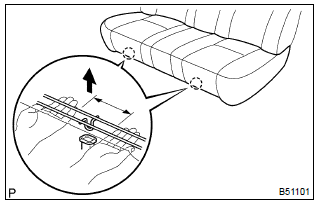Toyota Corolla (E120): Overhaul
1. Remove bench type rear seat cushion assy

- Disengage the 2 clamps, and then remove the seat cushion.
2. Remove bench type rear seat back assy
- remove the headrests.
- remove the 2 bolts and seat back.
3. Remove bench type rear seat cushion cover
- remove the hog rings and seat cushion cover.
4. Remove bench type rear seat back cover
- remove the headrest supports.
- remove the hog rings and seat back cover.
5. Install bench type rear seat back cover
- cover the top of the seat back pad with the seat back cover.
- install the headrest supports.
- using hog ring pliers, fully install the seat back cover with new hog rings.
Notice
:
- be careful not to damage the cover.
- Be careful to prevent the cover wrinkles as little as possible.
6. Install bench type rear seat cushion cover
- using hog ring pliers, install the seat cushion cover with new hog rings.
Notice
:
- be careful not to damage the cover.
- Be careful to prevent the cover wrinkles as little as possible.
7. Install bench type rear seat back assy
- hook the seat back to the body.
- install the 2 bolts.
Torque: 7.8 Nvm (80 kgfvcm, 69 in.Vlbf)
8. Install bench type rear seat cushion assy
- insert the seat cushion under the seat back.
- engage the 2 clamps.
Other materials:
Inspection procedure
Hint:
if different dtcs related to different systems that have terminal e2
as the ground terminal are output
simultaneously, terminal e2 may be open.
Read freeze frame data using the hand-held tester or the obd ii scan
tool. Freeze frame data records
the engine conditions when a malf ...
Vehicle lift and support locations
1. Notice about vehicle condition when jacking up
As a rule, the vehicle must be unloaded when jacking up. Never jack up
or lift up the vehicle loaded
with things of heavy weight.
when removing any parts of heavy weight like the engine and
transmission, the center of gravity of
...
Front differential oil seal (atm)
Replacement
1. Remove front wheels
2. Remove engine under cover rh
3. Remove engine under cover lh
4. Drain automatic transaxle fluid
remove the drain plug, gasket and drain atf.
install a new gasket and drain plug.
Torque: 17.5 Nvm (178 Kgf·cm, 13 ft·lbf)
5. Remove fron ...


